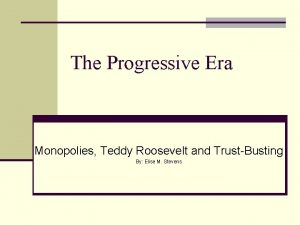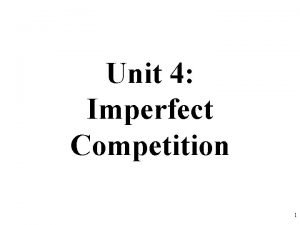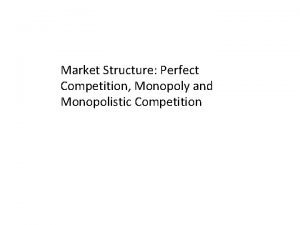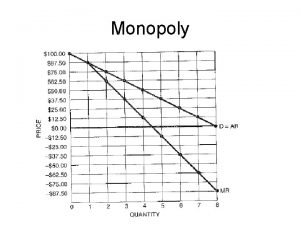Monopolies Content What a monopoly is Advantages of











- Slides: 11

Monopolies

Content • • What a monopoly is Advantages of monopolies Disadvantages of monopolies Monopolies and resource allocation

What a monopoly is • Monopoly – this is where there is a single producer in the market • Features: – One producer is able to charge relatively high prices – New products are rarely introduced – Resources are not used efficiently – Monopolies have market power – Monopolies are able to set prices

Features of Monopolies • Monopolies are price setters –they are able to set the price for the whole market • Some markets are considered to have “natural monopolies” in this case having one producer is seen as the ideal • If a natural monopoly occurs then to ensure resource allocation is efficient they need to be monitored by a regulatory body or watchdog e. g. OFTEL and British Telecom

Advantages of Monopolies • As monopolies often operate on an immense scale they can exploit economies of scale • Economies of scale occur when output increases and unit costs decrease • These cost reductions will lead to a decrease in costs and increase in profits for the monopoly producer • However some of the gains in productive efficiency may be transferred to the consumer in the forms of profits

Advantages of Monopolies • Government regulation of monopolies means annual price increases can be controlled • Some of the monopolies profits may be used to invest in research and development • This expenditure on innovation and invention could lead to efficiency gains in the market

Advantages of Monopoly • If a firm is operating as a domestic monopoly but is open to international competition their market power will be limited and they will therefore have to charge lower prices

Disadvantages of Monopolies • It is argued that monopolies producer at a lower output with higher prices than a producer in a competitive market would • This leads to a reduction in the consumer surplus and an increase in producer surplus • Supernormal profits are earned by the monopoly at the expensive of allocative efficiency

Disadvantages of Monopolies • The lack of any competition in the market can increase inefficiency as customers are stripped of the ability to choose • Dynamic efficiency may be lost if monopolist limits consumer choice and innovates less

Monopolies and Resource Allocation • Monopolies are viewed as a form of market failure as they do not allocate resources as efficiently as in perfect competition • As the consumer surplus is reduced this is seen as inefficiency and an example of where the market has failed to allocate resources in the optimum way

Summary • A monopoly is where there is one producer who dominates the market • In a monopoly the monopolist sets prices as they have market power • Monopolists can benefit from economies of scale which may be passed onto consumers in the form of lower prices • Monopolists may conduct more research and development • Monopolies produce less at higher prices reducing the consumer surplus • Economists view monopolies as market failure • Monopolies don’t allocate resources in the most effective way
 Trust busting progressive era
Trust busting progressive era Pure monopoly advantages and disadvantages
Pure monopoly advantages and disadvantages Lerner index
Lerner index Mr_below
Mr_below Advantages of monopoly
Advantages of monopoly Characteristics of esp
Characteristics of esp Static content vs dynamic content
Static content vs dynamic content Content based instruction disadvantages
Content based instruction disadvantages Advantages of content analysis
Advantages of content analysis Price ceiling on monopoly
Price ceiling on monopoly Monopoly graph
Monopoly graph Difference between monopoly and monopolistic competition
Difference between monopoly and monopolistic competition





















